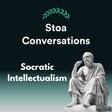
The Stoic Fragments: Hidden Wisdom from Epictetus (Episode 182)
Discover the hidden gems of Stoic philosophy in this exploration of Epictetus' fragments - those powerful passages preserved by other philosophers but lost from his main works.
Caleb and Michael unpack these concentrated nuggets of wisdom, from the surprising idea that we should value people by their capacity to help friends rather than harm enemies, to the famous "persist and resist" maxim that captures the essence of Stoic emotional management.
Learn why terrible people are already punished by their own character, how to judge humans by their true virtue rather than superficial success, and why no one is truly free without mastering themselves.
(00:00) MT: Fragments
(05:18) Fragment 7: Helping Friends vs. Harming Enemies
(10:43) Fragment 10: The Clean Jar - Approaching Philosophy Properly
(16:19) Fragment 10: The Famous "Persist and Resist" Maxim
(19:31) Fragment 13: Why Bad People Are Their Own Punishment
(25:39) Fragment 18: Judging Humans by Their True Excellence
(28:41) Fragment 17: The Banquet of Life
(31:29) Fragment 20: Becoming Resilient to Emotions
(37:04) Fragment 26: A Soul Carrying a Corpse
(39:39) Fragment 35: True Freedom Through Self-Mastery
***
Subscribe to The Stoa Letter for weekly meditations, actions, and links to the best Stoic resources: www.stoaletter.com/subscribe
Download the Stoa app (it’s a free download): https://stoameditation.com/pod
If you try the Stoa app and find it useful, but truly cannot afford it, email us and we'll set you up with a free account.
Listen to more episodes and learn more here: https://stoameditation.com/blog/stoa-conversations/
Check out our Youtube: https://www.youtube.com/@stoaphilosophy
Thanks to Michael Levy for graciously letting us use his music in the conversations: https://ancientlyre.com/



















